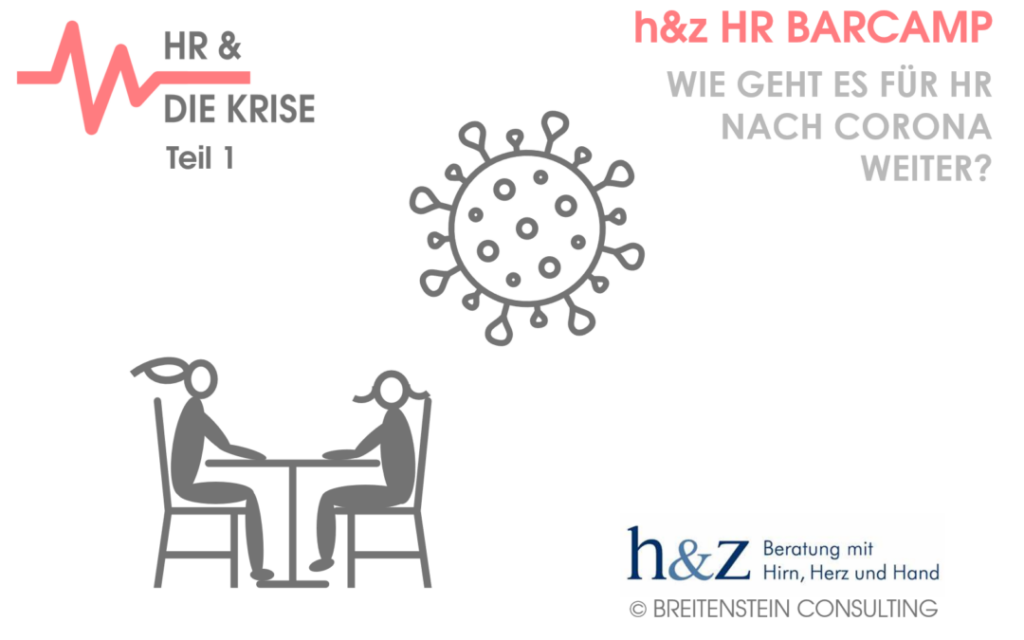At the first h&z HR BarCamp this week, we had an exciting discussion with HR professionals from seven companies on the question ‚HR, what’s next? – What lies ahead for HR after corona?‘
The HR BarCamp was not only the first h&z symposium focused on HR as a function, it was also a first in the new h&z building: directly opposite the Haus der Bayerischen Wirtschaft is now the new home of the h&z management consultancy in Munich. Freshly moved in. The HR BarCamp was the first customer event in the brand-new Bar Centrale in the foyer – of course in compliance with the strictest corona hygiene regulations with a limited number of people and plenty of distance, but still intensive discussions with representatives from Siemens, Airbus, GEMA, Digital Charging Solutions, TDX, Atreus and Wirecard.
Has HR outgrown itself in the crisis?
A small expert survey conducted in August of this year generated a few initial findings and hypotheses, which Bernadette Becker, Christiane Niess and Alexander Gisdakis presented and discussed with the group.
During the coronavirus crisis, HR has taken on a new central role in crisis management in all companies. Suddenly at the table of vital decisions – it’s about the employees: How do we protect them from infection? How do we set up a home office at short notice? How do we get government aid for short-time work? How do we support managers in virtual leadership?
Thomas Hierlemann (Airbus) emphasized how important it was for HR to always be personally present in the company for employees during the lockdown. “We were the ones who were always available to help the employees.”
Annegret Jansen (Wirecard) reported on the double crisis in her company: in the middle of the Corona crisis, the insolvency hit like a bombshell. As a result, HR took on a completely new role in crisis management and as a central point of contact and emotional anchor for employees in the organization.
“We were the ones everyone turned to when hardly any managers were available.” Despite the tragic end, many HR employees rose above themselves in this particular Wirecard crisis and took on responsibility.
Lessons learned for HR from the crisis
We were able to draw a few lessons from the first months of this crisis (which is not over yet!) together and generalize them for HR:
- If need be, things can be done very quickly and easily. Necessary ‚hands-on‚ decisions have brought HR closer to management in all the companies present.
- HR has also developed new digital communication channels and new formats for bringing employees together during the crisis. Sylvia Stelzer (DCS): “We have developed and tried out many new ideas for bringing our employees closer together virtually and strengthening team spirit.”
- The crisis has also revealed which functions in the company are key and, in addition, which managers have demonstrated real leadership qualities. Dirk Haselhorst (GEMA): “We always knew that we had managers and leaders. Now we have seen who our leaders are and why we really need them, especially in crises.”
Annegret Jansen (Wirecard): “In our case, it was not only the managers who showed leadership, confidence and drive, but also ordinary employees from the teams who suddenly showed what they were made of.”
Everyone agreed that an unplanned cultural change has begun in this crisis that can no longer be reversed.
Hypotheses about the future of HR after the Corona crisis
Alexander Gisdakis and Christiane Niess presented their vision and forecasts for the core topics for HR after the crisis in the form of hypotheses, which were discussed in detail.
There was agreement among those present that even if the pandemic were to subside quickly as a result of vaccination, it would no longer be possible to return to the world of work as it was before Corona.
There are several reasons for this:
- The pandemic has permanently changed value chains – entire industries will take years to recover (e.g. the aircraft industry).
- The threshold for home office has been crossed for good. Companies, managers and employees have recognized the benefits. Companies like Siemens have even set themselves specific goals: 2-3 days of mobile working per week worldwide as standard. These standards will become established. This also means that in the future, there would have to be a rethink and changes on the part of politicians, especially in tax and occupational health and safety laws.
- Even most of the managers who were previously critical of the home office have crossed their personal Rubicon in the Corona crisis and have gained confidence in their own virtual leadership abilities. However, Markus Kreysa and Thomas Hierlemann point out that manufacturing companies need a very differentiated approach to this. And thus a new area of tension arises: Who is allowed to work from home and who, by virtue of their function, is required to be present? And how can this be regulated sensibly and fairly in a company?
- The digital technologies associated with virtual work have developed by leaps and bounds in all the companies present during the last few months of the crisis, and the virtuoso handling of online sessions has achieved new standards everywhere. Nevertheless, some employees are also showing signs of fatigue, and occasional personal meetings in the office are generally experienced as beneficial and necessary.
- Many employees are already adapting their personal living conditions to the new virtual home office forms of work. For example, by moving to the countryside or setting up a study. This, too, will further consolidate the trend towards more virtual work.
- However, it is also clear that as a result, the direct, personal, ‚physical‘ connection to the employer will no longer play as strong a role as it has in the past. Retention work is therefore necessary and other formats for connecting to an organization and to a team must be developed. This includes making sure that the time spent in the office is actually used for high-quality relationship building. This has yet to be learned and established. It requires formats and appropriately equipped rooms. h&z has already implemented some of this in the new offices. At the same time, more attention needs to be paid to the question of how meaningful a task is. This is a challenge for HR and managers.
- Simultaneous restructuring and development of digitalization skills will be a source of tension for HR. How extensive is the restructuring experience of young HR colleagues? What cultural dilemmas arise from this parallelism? How do you solve these and further develop the culture in a targeted way? – This is another important future field of action for HR.
- The digitalization of HR processes in the sense of automation, management/employee self-service applications, which has been underway for years, will also receive a further boost from this. Which brings us back to an old question: What will be the role of HR when all administrative people processes in the company are digitalized and in the hands of the supervisors?
- Marion Weidenhausen from Atreus already sees these trends in her own company: “We already use AI-supported search algorithms in matching programs when placing interim managers. I ask myself what your role as HR will be in the future if the managers themselves do it at some point.”
The key question is: what will be the core function of HR in the future?
Dirk Haselhorst from GEMA then formulated the real key question of the evening as follows:
“We have to think about what the core function of HR will be in the future.”
Everyone agreed that the development of employment conditions that correspond to the digital world and the support of organizations, managers and employees in the sense of change management will probably be the two most important tasks for HR in the coming years. Petra Pötschke reported on precisely these two project strands at Siemens AG: “Workforce and workplace transformation are the two most important projects in HR at Siemens at the moment.”
This opens up a wide range of transformation work for HR: from creating the organizational conditions, to the corresponding workflows and processes, to changing the management culture, attitude and values in the company.
A little ‚deep drilling‚ at the end of the discussion on the topic of skills management makes the full scope of this change in the role of HR clear and really brings together all the points discussed during the evening:
Two fundamental structural elements in HR work are job profiles and employment conditions. These are guard rails that have standardized work in many companies on topics such as (core) working hours, job content, roles, necessary skills and a ‚hardwired‘ connection with income systems, collective agreements or performance evaluations.
This rigid structure could now be eliminated, forcing a reorganization of the underlying compliance instances, such as labor law, wage structures, etc. – and Corona will do this faster than anyone would have expected.
If, in the future, a customized workplace concept is to be created that is tailored to the necessities of a task, adapted to personal needs, and that clarifies questions such as presence, required services, social networking in teams and companies, training, goals, performance-related and fair remuneration or suitable management for each person and task individually, then this is hardly possible in the old, ‚classic‘ standardized employment conditions. Does a job allow for virtual work from home? How much personal presence and networking is possible and necessary? How should goals, leadership and collaboration be organized? And on the other hand: What can an employee actually achieve? What are their living and working conditions? Where do they need support?
Standardized (uniform) working hours, collectively agreed wages, company agreements, workplace equipment, training, and assessment systems are no longer helpful. Flexible models are needed in all these areas, and these need to be developed first.
This is the task of HR.
Individual negotiation of such tailor-made role concepts between the needs of the company and those of the employees also belongs in professional hands. Most managers would probably be overwhelmed by this professionally as well.
Sylvia Stelzer (DCS): “As HR, we are the ones who always look at the company from a people perspective and design everything to optimally meet the needs of the company and its employees.”
This requires professional empathy for individual needs on the one hand and a deep understanding of the strategic needs of the company on the other. And the design of the tailor-made framework for this.
This is human resources work in the truest and original sense – and at the same time an enormous challenge for labor legislation, works constitution and collective bargaining partners in the coming years!



